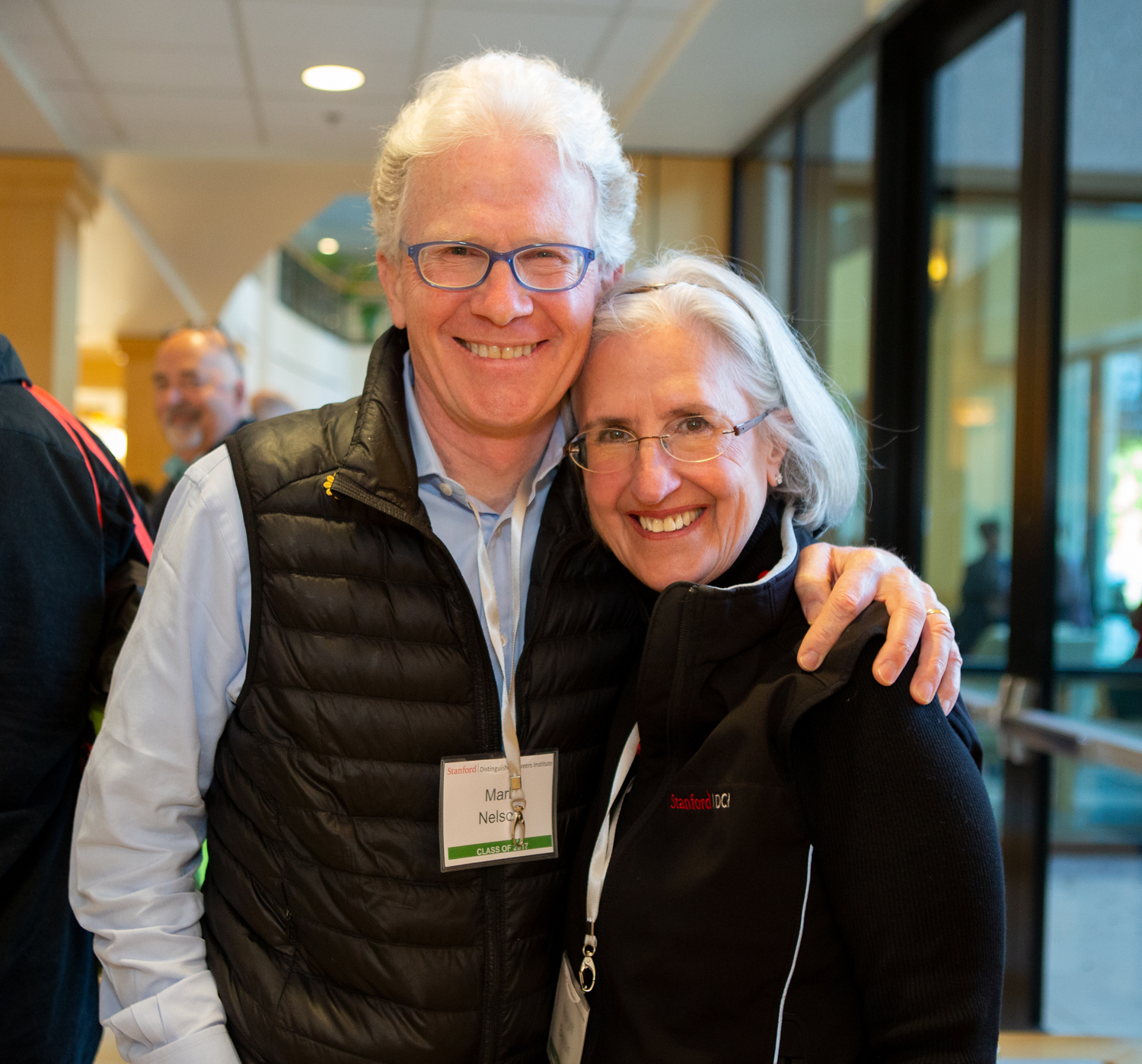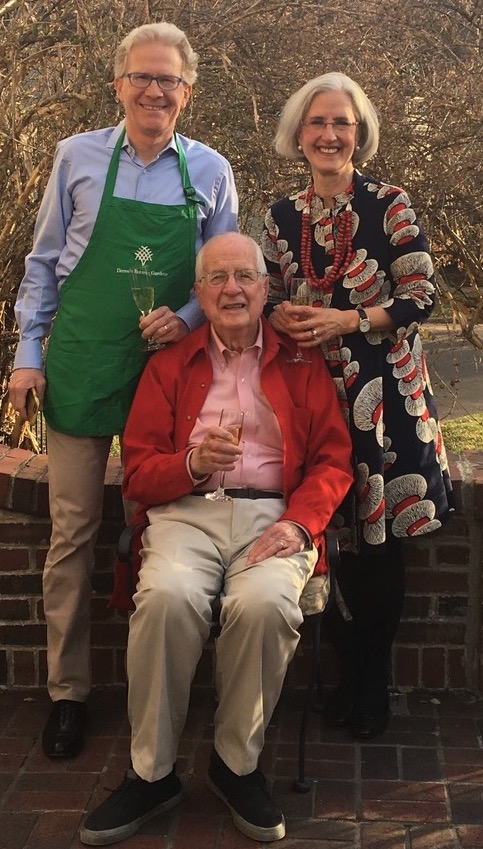Taking the Concept of “Community” Home

MARK NELSON & MARGRIT BENTON
(DCI 2017)
Former attorneys Mark Nelson and his wife, Margrit Benton, spent several years living in Indonesia and Singapore before participating in the Stanford DCI program in 2017. As a commercial lawyer, Mark advised multinational corporations, private equity investors and financial advisors. Margrit focused on securities and antitrust matters, as well as a pro bono death penalty case.
In addition to their DCI fellowship, living and working in Singapore and Indonesia for nearly 30 years prior to entering the program gave them the tools and the cultural learnings to approach their new roles with a sense of gratitude “for the ability to help out.”
Margrit Benton and Mark Nelson (DCI 2017) didn’t plan on moving back to Margrit’s childhood home in Denver to take care of her aging father after their DCI year.
Both of them agree that they just “fell into it.” And both of them agree that they would not have traded the experience for anything.
Margrit’s dad, Ed Benton, passed away earlier this year. He died in the home he shared with his beloved daughter and son-in-law, surrounded by a neighborhood and community he had built over a lifetime, in close contact with his grandchildren and having met at least half of Margrit and Mark’s DCI cohort.
Although their caregiving journey was unplanned, both Margrit and Mark attribute their ability and willingness to embrace the experience to the sense of community they developed during their time at Stanford.
“The focus on community” during the program and “the relationships that came out of that year” stayed with the couple as they considered what to do next. After a year of traveling, the question was answered when Ed had a catastrophic fall and needed round-the-clock care.
It was an “easy thing” to make the decision to help Ed stay in his home, said Mark. Ed was an “engaged, easy-going 92-year-old, with a great sense of humor.”
Moving to Denver, Margrit and Mark also put their DCI community-building lessons to work in figuring out “how to create a community when you haven’t been a part of it for 30 years.” The pandemic made the lessons they’d learned about community even more relevant, as they welcomed neighbors and friends visiting Ed as his mobility declined and held cocktail hours on the terrace behind “Opa’s” house – Ed’s pet name from his grandkids – to discuss local and world affairs.
With Ed, “it was not about the food, but about the conversation,” said Margrit. But while Ed relished the social interaction, those lucky enough to find themselves on “Opa’s Porch,” as the couple’s daughter, Emily called it, took away much more. In her college essay about lessons learned on that porch, Emily wrote, “We had to talk about the real issues,” or in Ed’s words, “Cut the persiflage!” Persiflage is what Ed called mindless chatter. He wanted his grandkids to engage with current problems and tell him what they would do to fix them.
It would be wrong to understand Mark and Margrit’s caregiving as one-sided. Although Mark jokes that they lived under “house arrest” for two years with a “full-time low-intensity job,” both he and Margrit agree that to “focus on someone other than yourself” was a transformative and joyful experience.
Not only DCI but their nearly 30 years living and working in Singapore and Indonesia prior to entering the program gave them the tools and the cultural learnings to approach their new roles with a sense of gratitude “for the ability to help out.”
During their years abroad, Mark and Margrit and their kids internalized the “strong desire for families to accommodate old folks around them.”
“Older people are not as isolated” in Asian cultures, Mark pointed out.
“Multi-generational housing is the norm,” said Margrit.
Back in Denver, the intergenerational learnings continued. “We learned so much from the community around us,” Mark said. Ed’s community — built over a lifetime of professional and civic involvement — became theirs. It encompassed “an extraordinary age range” that was a gift to all involved.
The couple’s recent experience also brought home the fact that longer lives may not necessarily mean more time for world-changing projects or huge social impact.
“The reality of many people’s experiences as we age,” Margrit argues, “may be that we don’t have the ability to do all the things we thought we could do. So we need to celebrate what we can still do.”
Recognizing that reality, both Mark and Margrit believe, should be an integral part to designing a life going forward, for our aging family members and for ourselves.
Or, as Margrit put it, all of us need to think, and talk to our families, about this question: “If you only get three things” as you get older, what are the three things that you want to be able to do?”
In Ed’s case, he wanted to “(1) go to lunch at the club to see his friends; (2) have people around the dinner table; and (3) sit on his porch where he could interact with people walking by.”
For three years, Margrit and Mark gave Ed his three things and more. He gave them his company, his wisdom, and his community. To hear them tell it, they got the better end of the deal.
The memorial flyer at Ed’s recent memorial service contained Ralph Waldo Emerson’s famous lines:
“To laugh often and much; To win the respect of intelligent people and the affection of children; to earn the appreciation of honest critics and endure the betrayal of false friends; to appreciate beauty; to find the best in others; to leave the world a bit better whether by a healthy child, a garden patch, or a redeemed social condition; to know even one life has breathed easier because you lived. This is to have succeeded.”
Although they would never put it this way themselves, Margrit and Mark have also “succeeded.”

Mark, Margrit and Ed (aka “Opa”) enjoy a glass of wine together on a mild Denver afternoon.
Learn more
Rocky Blumhagen - Yoga, Mindfulness, Breathwork (website)
What Does a 1000 Day Commitment Really Mean?
By Kristin Goldthorpe, Stanford DCI, Communications Manager
